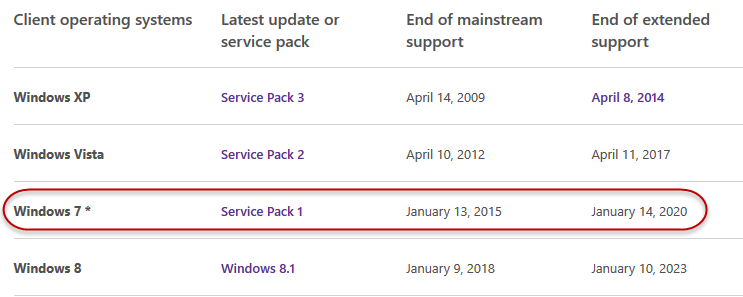 Windows 7 reached its end of mainstream support date on 13th January and has now moved into its extended support phase. Basically, that means Windows 7 has hit middle age, something that happens to all of us sooner or later. Technically, it means that, from here on, Microsoft will not be adding any new features or enhancements into Windows 7, and updates will accordingly be restricted to security related only. It also means no more free Microsoft support – for whatever that’s worth.
Windows 7 reached its end of mainstream support date on 13th January and has now moved into its extended support phase. Basically, that means Windows 7 has hit middle age, something that happens to all of us sooner or later. Technically, it means that, from here on, Microsoft will not be adding any new features or enhancements into Windows 7, and updates will accordingly be restricted to security related only. It also means no more free Microsoft support – for whatever that’s worth.
Windows operating systems historically go through two main support phases covering 10 years total, starting off with mainstream (or full) support for the initial 5 years, and then moving into extended support for a further 5 years.
Windows 7 Extended Support
There is no need for concern now that Windows 7 has moved into its extended support phase. Extended support will go right through until January 2020, during which time users will continue to receive important security updates. So, Windows 7 will remain viable and safe to use for a long while yet, 5 years too be exact.
Since new features are no longer a part of Windows 7’s future, it’s unlikely that new technologies, such as DirectX 12 and the “Spartan” browser expected to be included with Windows 10, will be made available for Windows 7. However, the critical aspect here is that security patches will continue unabated through to 2020.
Bottom Line
With Microsoft’s operating system release cycle now shortened considerably, we’ll likely see at least two more new versions before Windows 7 actually expires. Windows 10 is slated for release later this year and Windows 11 (or whatever Microsoft decides to call it) will almost certainly see daylight prior to 2020. There is also the possibility of a subscription-based distribution model on the horizon – the omens certainly suggest that as being a distinct likelihood.
Regardless of all that, Windows 7 users can safely continue using their operating system for a further 5 years before they need to make any decision on possible upgrade options.
Personally, I hope Windows 10 is a hit so users will begin migrating early in the cycle rather than waiting until the last possible moment. But that, as they say, is another story.


It isn’t going to mean a damn thing to me. I will continue to use Win7, just like I have continued to use XP. I want nothing to do with Win10 and where Microsoft is going.
I’m curious about the Updates: sometimes they come 12 at a time. Does anyone know for sure if these updates cumulatively slow down the PC ? I’m thinking of my WIN XP and the eventual 3 Service packs. I know they slowed my PC a lot .
I guess they’d have to have some sort of cumulative effect Jack. However, I believe it would be minimal provided there is still plenty of free space on the hard drive.